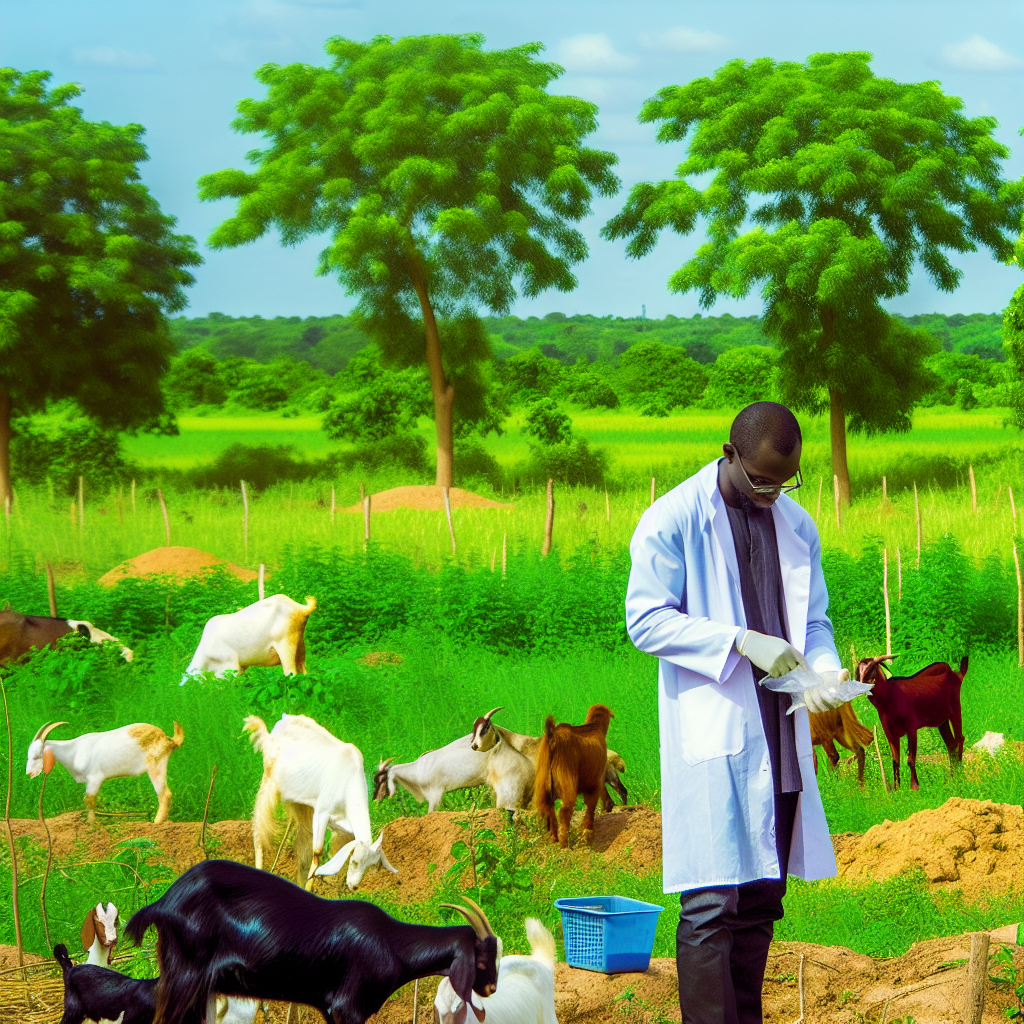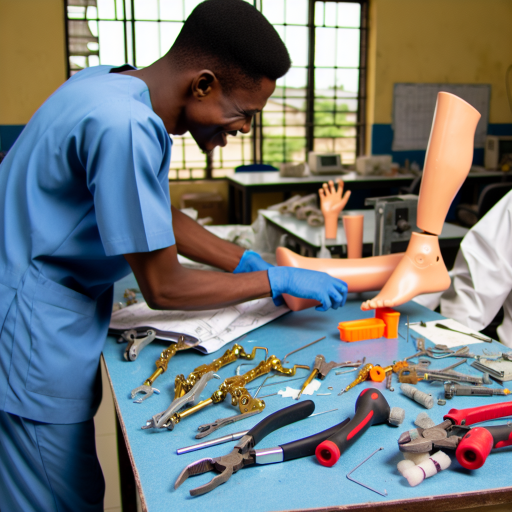Introduction:
Agriculture in Nigeria is a critical sector for economic growth and food security.
Veterinary medicine plays a vital role in supporting Nigerian agriculture.
Through various veterinary practices, the health of livestock is ensured.
Veterinarians contribute to disease control, vaccination programs, and treatment.
They also provide expertise in nutrition, breeding, and overall animal care.
By improving animal health, productivity and quality of products are enhanced.
Veterinary medicine is essential for sustainable agriculture and food production.
It also plays a key role in ensuring food safety and public health.
Overall, the role of veterinary medicine in Nigerian agriculture is indispensable.
Importance of Livestock in Nigerian Agriculture
Livestock farming plays a crucial role in the agricultural sector of Nigeria.
- Livestock farming provides a sustainable source of income for farmers, especially in rural areas.
- It helps in meeting the nutritional needs of the growing population by providing protein-rich products like meat, milk, and eggs.
- Livestock also serves as a source of employment, creating opportunities for both skilled and unskilled workers.
- It plays a key role in poverty alleviation and food security by ensuring a stable supply of animal products.
- Livestock farming contributes to the overall GDP of Nigeria, generating revenue through exports of livestock products.
Challenges Faced by Livestock Farmers
Despite its importance, livestock farming in Nigeria faces several challenges that hinder its growth and productivity.
- One of the major challenges is the prevalence of diseases that affect livestock, leading to significant economic losses.
- Poor animal healthcare services and limited access to veterinary medicine make it difficult for farmers to manage and prevent diseases.
- Lack of proper infrastructure and support services, such as quality feed, water, and sanitation facilities, negatively impact livestock health and productivity.
- Climate change and environmental degradation pose risks to livestock farming, affecting the availability of pasture and water resources.
- Market access and pricing issues also add to the challenges faced by livestock farmers, impacting their profitability and sustainability.
Preventing and Controlling Diseases in Livestock
Veterinary medicine involves vaccination programs to prevent diseases in livestock.
Regular check-ups and diagnostic tests help in early detection and treatment of diseases.
Quarantine measures are implemented to prevent the spread of contagious diseases among livestock.
Proper sanitation and hygiene practices are promoted to reduce the risk of disease transmission.
Educating farmers on disease prevention strategies and biosecurity measures is essential in livestock management.
Common Diseases in Nigerian Livestock
- Contagious Bovine Pleuropneumonia (CBPP) is a severe respiratory disease affecting cattle, leading to economic losses.
- Foot-and-Mouth Disease (FMD) affects cloven-hoofed animals, causing lameness and reduced productivity.
- Newcastle Disease is a viral infection that affects poultry, resulting in high mortality rates.
- Contagious Caprine Pleuropneumonia (CCPP) affects goats, leading to respiratory distress and death if not treated.
- African Swine Fever (ASF) is a viral disease that affects pigs, causing high mortality rates and trade restrictions.
Impact of Diseases on Agriculture
- Diseases in livestock lead to reduced meat and milk production, affecting food security in Nigeria.
- High mortality rates due to diseases result in financial losses for farmers and the overall agricultural sector.
- Disease outbreaks can lead to trade restrictions, affecting the export of livestock products.
- Animal diseases pose a threat to public health, as some diseases can be transmitted to humans.
- Investment in disease prevention and veterinary care is essential for sustainable agricultural development in Nigeria.
You Might Also Like: Innovations in Ophthalmology: Nigerian Contributions
Role of Veterinarians in Animal Health Management
Veterinarians play a crucial role in ensuring the health and well-being of livestock through various responsibilities.
They conduct regular health check-ups to detect and prevent diseases at an early stage.
Veterinarians provide appropriate medical treatment and care for sick animals to promote their recovery.
They advise farmers on proper nutrition requirements for different types of animals to maintain optimal health.
Implementing vaccination programs helps protect animals from common diseases and prevent outbreaks.
Veterinarians educate farmers on hygiene practices to minimize the spread of infections and maintain a clean environment.
They conduct routine inspections of farms to ensure compliance with health and safety standards.
Proper nutrition is essential for the overall health and productivity of livestock.
Veterinarians recommend balanced diets tailored to the specific nutritional needs of each type of animal.
Adequate nutrition boosts immune function, enhances growth rates, and improves reproductive performance.
Lack of proper nutrition can lead to deficiencies, weakened immune systems, and a higher susceptibility to diseases.
Vaccination programs are essential for disease prevention and control in livestock.
Veterinarians administer vaccines based on the specific health risks prevalent in the region or on the farm.
Vaccination helps build immunity against common diseases, reducing the likelihood of outbreaks.
Regular vaccination protocols are designed to protect animals and prevent economic losses due to diseases.
Hygiene practices are crucial for maintaining a healthy environment for livestock.
Veterinarians emphasize the importance of clean water sources, proper waste disposal, and disease control measures.
Good hygiene practices reduce the risk of infections, contamination, and the spread of diseases among animals.
Implementing hygiene protocols helps create a safe and conducive environment for optimal animal health.
Veterinarians play a vital role in animal health management by ensuring proper nutrition, vaccination, and hygiene practices are followed.
Their expertise and guidance are essential for promoting the health and well-being of livestock in Nigerian agriculture.
Explore Further: Financial Aspects of Anaesthesiology in Nigeria
Veterinary Services and Access in Nigeria
When it comes to veterinary services in Nigeria, there are several factors that influence the availability and accessibility of these services in different regions of the country.
Transform Your Career with Expert Guidance
Get personalized mentorship consulting that’s tailored to your unique path. Our expert advice is actionable and exclusive.
Get StartedIn this section, we will explore the current state of veterinary services in Nigeria and the challenges faced by veterinary professionals in providing these services to farmers.
Availability of Veterinary Services
- In urban areas such as Lagos and Abuja, there is generally better access to veterinary services due to the presence of modern veterinary clinics and hospitals.
- However, in rural areas where the majority of farmers are located, access to veterinary services is limited due to a lack of infrastructure and trained professionals.
- Most rural communities rely on government veterinary clinics, which are often understaffed and underequipped to meet the needs of the farming population.
- Private veterinary clinics are scarce in rural areas, making it difficult for farmers to seek timely medical care for their livestock.
- The lack of veterinary services in rural areas contributes to the high mortality rates among livestock, resulting in economic losses for farmers.
Challenges Faced by Veterinary Professionals
- One of the biggest challenges faced by veterinary professionals in Nigeria is the limited funding and resources allocated to the veterinary sector.
- This lack of financial support makes it difficult for veterinary clinics to purchase essential equipment and supplies needed to provide quality care to animals.
- Another challenge is the shortage of trained veterinarians in Nigeria, especially in rural areas where the demand for veterinary services is high.
- Many veterinarians in Nigeria are overworked and underpaid, leading to job dissatisfaction and high turnover rates in the profession.
- The poor working conditions and low salaries discourage young professionals from pursuing a career in veterinary medicine, further exacerbating the shortage of veterinary professionals in the country.
Access to veterinary services in Nigeria is vital for the success of the agricultural sector.
It is crucial for the government and private sector to invest more resources in the veterinary sector to improve the quality of care provided to livestock.
This investment will ultimately boost food production in the country.
Uncover the Details: Notable Nigerian Microbiologists and Their Work

Economic Impact of Veterinary Medicine in Nigerian Agriculture
When considering the economic impact of veterinary medicine in Nigerian agriculture, several key factors come into play.
- Increased Productivity
Investing in veterinary medicine leads to healthier livestock, which translates to increased productivity in terms of meat, milk, and other agricultural products. This, in turn, boosts income generation for farmers. - Improved Livestock Quality
By ensuring that livestock are healthy and well-cared for, veterinary medicine helps maintain the quality of livestock. Healthy animals result in better meat and dairy products, fetching higher prices in the market. - Disease Prevention
Veterinary medicine plays a crucial role in preventing and controlling diseases among livestock. Diseases can decimate entire herds if left unchecked, leading to massive economic losses for farmers. By investing in veterinary care, farmers can protect their animals and maintain their livelihood. - Enhanced Food Security
Healthy livestock contribute to food security by ensuring a stable supply of meat, milk, and other animal products. This not only provides nutritious food for the population but also reduces the risk of food shortages during times of scarcity. By investing in veterinary medicine, farmers can help meet the nutritional needs of the country. - Income Diversification
Veterinary medicine also enables farmers to diversify their sources of income. By maintaining healthy livestock, farmers can sell surplus animals or products, such as milk and eggs, for additional revenue. This extra income can help improve their standard of living and provide financial stability for their families. - Market Access
Access to markets can be restricted if livestock are unhealthy or diseased. Veterinary medicine ensures that animals meet the necessary health and safety standards required for commercial trade. By investing in veterinary care, farmers can access a wider range of markets, both domestic and international, increasing their earning potential. - Sustainable Agriculture
Investing in veterinary medicine promotes sustainable agricultural practices by ensuring the long-term health and well-being of livestock. Healthy animals are more resilient to environmental challenges and less likely to require costly interventions. This promotes sustainability in agriculture and helps protect the resources on which farmers depend.
The economic benefits of investing in veterinary medicine for Nigerian farmers are substantial.
From increased productivity and improved livestock quality to enhanced food security and income diversification, veterinary care plays a crucial role in supporting the agricultural sector.
By prioritizing the health of their livestock, farmers can secure their livelihoods, contribute to the country’s food supply, and build a more resilient and sustainable agricultural industry.
Gain More Insights: Patient Experiences with Prosthetics in Nigeria
Government Support and Policies for Veterinary Medicine
The Nigerian government has implemented initiatives to promote veterinary medicine.
One such initiative is the establishment of veterinary hospitals and clinics.
These facilities provide healthcare services for animals and training for veterinarians.
The government also offers scholarships and grants for students pursuing veterinary medicine.
This encourages more individuals to enter the field and enhances the workforce.
Another policy is the regulation of veterinary practices to ensure quality standards.
This protects animals from unqualified practitioners and upholds ethical standards.
However, there are areas where government intervention is needed for further support.
One key area is the need for increased funding for research in veterinary medicine.
Research is crucial for developing solutions to emerging health challenges in livestock.
Government support can also help modernize veterinary infrastructure and technology.
Upgrading facilities and equipment can improve the quality of care for animals.
Additionally, training programs for veterinarians should be expanded and updated.
Continuous education is essential for keeping professionals abreast of advancements.
Moreover, policies should be put in place to incentivize private sector investment.
Encouraging private companies to invest in veterinary services can boost the sector.
Overall, government support and policies play a significant role in advancing veterinary medicine in Nigerian agriculture.
Veterinary Medicine’s Impact on Livestock Health
Veterinary medicine plays a critical role in Nigerian agriculture by ensuring the health and well-being of livestock.
With the growing demand for animal products in the country, veterinary professionals are essential.
They prevent and manage diseases that can devastate farms and threaten food security.
By providing preventive care, conducting vaccinations, and treating illnesses in animals, veterinarians contribute to overall productivity and sustainability.
Furthermore, their expertise safeguards the health of livestock and protects human health.
This minimizes the spread of zoonotic diseases.
Veterinary medicine promotes the responsible use of antibiotics.
This practice helps prevent the emergence of antibiotic-resistant bacteria.
The proactive approach to healthcare in agriculture is crucial.
It maintains the quality and safety of animal products consumed by the Nigerian population.
The role of veterinary medicine in Nigerian agriculture cannot be overstated.
It is a cornerstone of agricultural development and food security in the country.
Veterinary professionals ensure livestock producers can meet the demand for protein-rich foods.
They also maintain the health and welfare of their animals.
Veterinary professionals are essential partners in sustaining a thriving agricultural industry.
This industry is vital to the economic growth and well-being of the Nigerian population.
Additional Resources
INTERACT Speakers | Oklahoma State University
Learning from One-Health approaches to explore links between …




